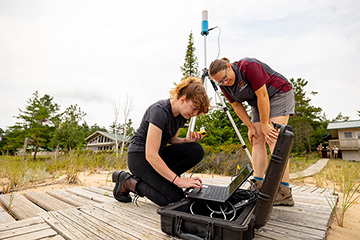Improving patient safety in hospitals
Strategies to minimize effects of network downtimes on critical ICU devices
CMU Health Administration doctoral student, Melissa Jackson, started her career in healthcare as a paramedic. Jackson’s experience in patient care inspired her research centered around identifying the effects of unplanned network downtime on network-connected devices in intensive care units (ICU). The goal of her research, supervised by Nailya Delellis, Ph.D. and Dimitrios Zikos, Ph.D., was to determine how a long-term network downtime would affect patient care and safety.
Jackson chose to examine the ICU of an acute care hospital because the large number of web-connected devices, including its virtual provider access, allowed her to better examine the consequences of network downtime. She conducted a focus group of technical experts and healthcare professionals to learn how each device would be affected during a network downtime. Jackson was also able to validate her findings when an unexpected network shutdown happened during her project that shut down 75% of servers at the hospital.
Jackson found that many ICU communication systems are heavily dependent on being connected to a network. Devices like phones, paging systems, and panic alarms all need a network to function. She said losing the ability to communicate in the ICU can pose a significant risk to patients. Through understanding the vulnerabilities of ICU systems, Jackson said hospitals can put patient safety measures in place. Jackson hopes hospitals can use her findings to develop protocols for workers during unplanned network failures, and she is expanding her studies to include effects on centralized patient access centers.



